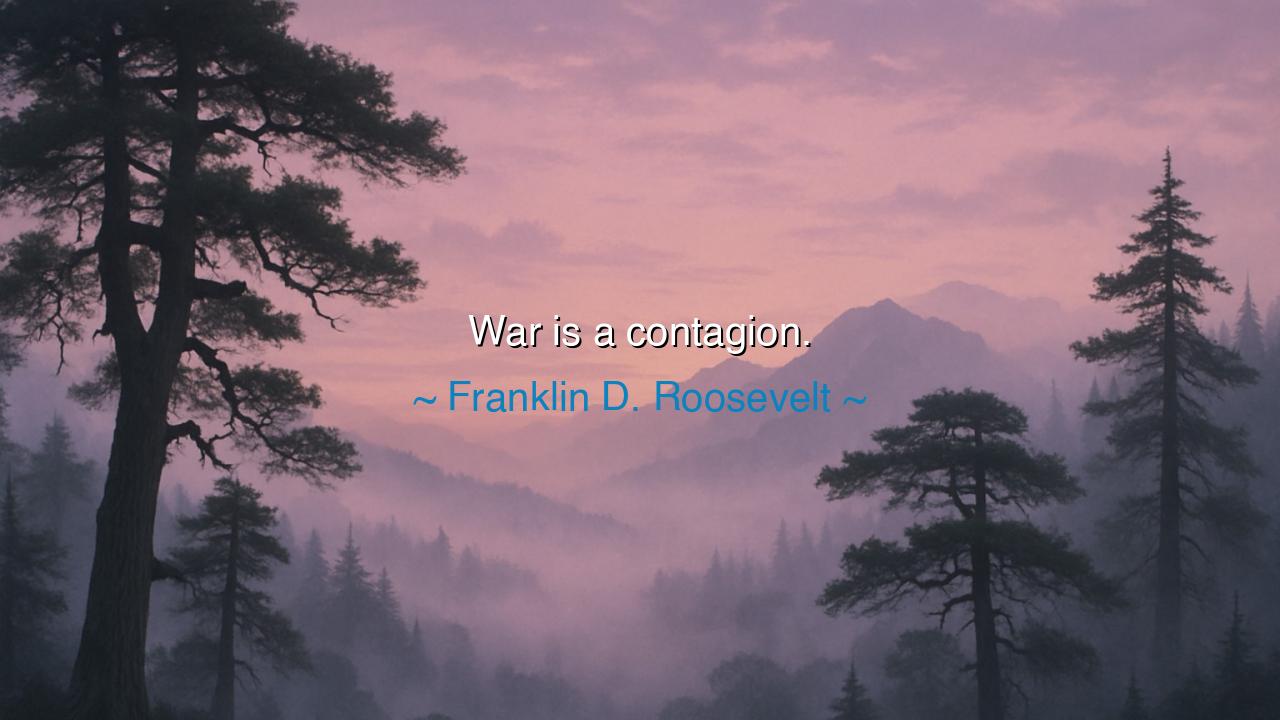
War is a contagion.






Franklin Delano Roosevelt, the voice of America in its most perilous hour, once warned with solemn gravity: “War is a contagion.” These words are not spoken as metaphor alone, but as prophecy, for Roosevelt saw with clear eyes how the fires of conflict spread from one land to another, how battles that begin in one corner of the earth infect the hearts and minds of distant nations. Like a plague, war does not remain confined—it leaps borders, consumes innocents, and transforms entire generations.
The origin of this saying lies in 1937, when Roosevelt addressed the American people during a time of growing unrest abroad. Japan had invaded China, fascism was rising in Europe, and yet the United States remained officially neutral, wary of being drawn once more into the storms of foreign wars. Roosevelt, however, saw the truth: war in one place was not contained, for its influence spread like disease, infecting economies, politics, and the fragile peace of the world. By declaring “war is a contagion,” he sought to awaken his people to the danger of believing they could remain untouched by the conflicts of others.
The meaning of his words is both simple and profound: violence spreads. Just as a flame consumes all it touches, war draws in those who believe themselves safe. Neutral nations find themselves trading weapons, sheltering refugees, suffering economic shocks, and finally, facing the choice of submission or resistance. The contagion of war is not only the movement of armies, but the spread of fear, hatred, and vengeance. Once unleashed, it multiplies until all are drawn into its grasp.
History proves this truth again and again. Consider the First World War, born from the assassination of an archduke in Sarajevo. What began as a quarrel between Austria and Serbia became a wildfire that engulfed Europe and beyond, dragging nations into bloodshed that had little to do with the original spark. Alliances pulled one after another into the flames, and soon the world was aflame. The contagion spread not because men desired it, but because once war begins, it infects the balance of nations, and none can remain untouched.
Even in modern times, this contagion is clear. The conflicts in the Middle East, sparked by invasions, uprisings, and extremism, have spread far beyond their borders—refugee crises reaching Europe, terrorism striking distant cities, economies disrupted worldwide. Here too we see Roosevelt’s wisdom: war cannot be locked within the walls of a single land. Its poison seeps into the veins of humanity as a whole.
Yet within his warning lies also a call to vigilance. If war is a contagion, then peace is the medicine, and justice the shield. To stop war from spreading, one must resist it early, treat it at its source, and guard against the lies and hatreds that feed it. Roosevelt’s words remind us that passivity in the face of war is folly, for by ignoring its outbreak elsewhere, one only ensures its arrival at one’s own door.
The lesson for us, children of tomorrow, is this: never imagine yourself immune to the suffering of others. When injustice burns in a distant land, when violence consumes a neighbor, know that its contagion will one day touch you as well. Act not with indifference, but with foresight. Support peace, defend justice, aid the afflicted, and oppose tyranny—before the plague of war spreads too far.
Practical wisdom calls for vigilance in daily life, too. Do not allow anger and hatred to fester in your own heart, for they are the seeds of conflict. Speak with truth, seek reconciliation, and resist the small contagions of bitterness and division, lest they grow into greater wars of the spirit. For as nations are infected by war, so too are communities infected by discord. And as peace begins in the heart, so too does conflict.
Thus, let Roosevelt’s words echo across generations: “War is a contagion.” Treat it as the plague it is, and you will not only protect yourself, but you will safeguard the future. Let peace be your medicine, let justice be your shield, and let memory be your teacher. In this way, the contagion of war may one day be cured, and the nations healed of their endless fevers.






QTManh Quan Tran
The idea that war is a contagion speaks to the way it spreads beyond borders, influencing global stability. But it also raises the question of whether the world has learned from history. Is it possible for modern societies to contain the spread of war, or are we destined to repeat the mistakes of the past as the forces of nationalism, power, and greed fuel further conflict?
NSThang Nguyen Sy
Roosevelt’s view on war as a contagion makes me think about the ripple effects of conflict. It’s not just the direct participants who suffer; other nations, economies, and people can be drawn in, whether they want to or not. How do we, as global citizens, prevent the 'contagion' of war from spreading? What role do international organizations and diplomacy play in containing it?
UGUser Google
By calling war a 'contagion,' Roosevelt captures its infectious and destructive nature. The way war spreads from one country to another, often in ways that seem beyond the control of individuals, is chilling. But does this mean that all wars are equally avoidable, or are there some situations where war becomes a necessary response to aggression or injustice?
DQDang Diem Quynh
Roosevelt’s comparison of war to a contagion is a powerful metaphor. It suggests that once war begins, it spreads uncontrollably, affecting nations and individuals alike. Is this an inevitable consequence of conflict, or can diplomacy and peaceful resolution prevent it from spreading? How much of the escalation of war can be traced back to the actions of a few key decision-makers versus broader societal pressures?